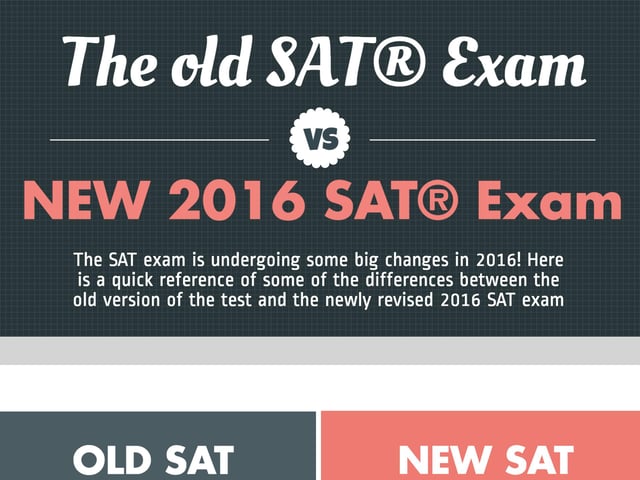
The NEW 2016 SAT® Exam Changes: What Does it Mean for You?
You’ve probably heard that there is a new version of the Scholastic Aptitude Test (SAT) exam coming soon. True fact: If you take the SAT exam in the spring of 2016 or after, you will take a redesigned version of it. There has been a lot of talk about this new test and we want you to have all the facts, so here are the “whats, whys, and wherefores” of the redesigned SAT exam for 2016.
Today’s academic world would be unrecognizable to the students of just 10 or 15 years ago. Information of all kinds is just a mouse-click away and there is more of it than anyone can possibly absorb. So, it has become much more important to be able to access and use that information than to simply recall it.
Recently, there has also been a great deal of study and research concerning the exact skills and aptitudes necessary to function in this new college and career arena. Professional educators at all levels have identified the most important college and career readiness traits and skills, discarding those that really don’t affect future success.
It is for these reasons that, like many of today’s exams, the SAT exam is undergoing major revisions. Test designers are realizing that knowledge is not the only thing a person needs to succeed in this world. Knowing facts is just not enough. You also need to be able to “think on your feet” to be an effective student and worker.
As a result, the College Board®, who administers the SAT exam, has revamped their test for the first time in 11 years. Some sources say that the changes are more sweeping than any SAT exam modification in the last 30 years. The new exam has been altered to measure more of the skills needed in college and the workforce. It will also be more aligned with current high school curriculum, which has undergone considerable revision in recent years.
The scoring process has changed, as well. Scores are designed to more specifically point out areas of strength and weakness and are proposed to be more useful to students, counselors, and colleges.
Test creators are still tweaking exact time limits and number of questions per section, as they research the new format, but here are some of the basic changes:
-
Overall testing time is down to 3 hours, from 3 hours and 45 minutes.
-
There is no penalty for guessing or leaving answers blank because only correct answers earn scoring points. No points are subtracted for anything.
-
Forget the 2400 possible points on the old SAT exam. Now, possible scores are between 400 and 1600 for the two required portions (Evidence Based Reading/Writing and Math). The optional essay scores will be reported separately and you will score between 2 and 8 for each of the three writing skills evaluated.
-
Besides your total score, there will be a few other “subtest” scores given to test-takers. These are scores you earned on specific portions within the test.
-
According to the College Board, you will need to have “a stronger command of fewer topics.” Click on this link from the official College Board website to read more on this.
-
There will only be four answer choices, instead of the previous five. But you may need to perform several steps in order to find the answer.
-
The new test will be available on computer as well as in paper-and-pencil format.
-
The essay is now optional and students may choose to either take it or not based on the application requirements of your chosen college(s).
-
If you do choose to take the essay, it will be given after the other SAT exam sections.
-
The time allowed to write the optional essay has doubled, from 25 to 50 minutes. However, instead of just writing your opinion on a topic, you will need to read, analyze, and write about an already written passage.
Within individual test sections, these are some trends in the new test:
-
Math will emphasize foundational concepts and skills―the basics.
-
You will need to go through several steps to find some answers.
-
You will need to tell why something is true by citing evidence from a reading selection.
-
Reading selections will be more complex and include more nonfiction than fiction material.
-
Concerning vocabulary, you won’t necessarily need to know the meaning of more difficult words. You will need to know various definitions for more common words, when they are used in different contexts.
So, what do all these changes mean for you, the college-bound student? Well, there is good news here!
-
Your high school has been preparing you for just this type of test. Today’s high schools are teaching differently, helping you to be ready for this kind of assessment.
-
The new test is designed to show your absolute best work on previously studied concepts, and it avoids testing things on which you did not focus in high school and things that are irrelevant to college success.
-
While not the only source of information about your abilities, scores on this test should actually be a good predictor of your current ability to succeed in college today, which has also changed dramatically in recent years.
-
Instead of just reporting large “lumped” scores, the new SAT exam scores will be broken down into more manageable divisions, indicating exactly where you need to focus attention if you need to retake the test. It will also give you more information regarding additional skills you might want to focus on in college so that you are ready for a career and career training.
And, the best news of all, we, at Union Test Prep, will be here for you, ready with all the changes and the materials you will need to score big on the redesigned SAT exam for 2016. Bookmark us now so you can check here for updates and new study and practice materials. They are on their way!
SAT® and CollegeBoard® are trademarks registered and/or owned by the College Board, which was not involved in the production of, and does not endorse, this website

Keep Reading

SAT Exam Blog
Discontinuation of the SAT Essay and What It Means for Students
The SAT, a staple of American college admissions for decades, has seen …

SAT Exam Blog
How Many Questions Are on the SAT?
Embarking on your college journey involves several important milestones…

SAT Exam Blog
SAT Test Dates 2019–2020
For the latest COVID-19-related testing information, please see our fr…